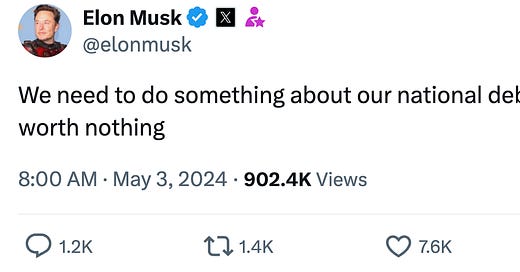Debt Digest | TODAY: Senator Cassidy Will Give Opening Remarks at 9:15 AM ET
Links & Fiscal Facts
The Social Security Symposium: A Global Perspective begins in 45 minutes with opening remarks by Senator Cassidy (R-LA) at 9:15 AM ET. According to Senator Cassidy, “The greatest threat to Americans not receiving their promised Social Security benefits is politicians choosing to do nothing. Not inflation or any other economic woes. The next president must find the courage to be honest with Americans that Social Security needs help to avoid the automatic 21% cut in nine years.”
Unsustainable spending threatens the Fed's autonomy.
Musk is not wrong. With the unsustainable growth in spending on old age benefit programs, the erosion of central bank independence is a growing risk. Government money printing to finance deficit spending can lead to hyperinflation and economic ruin. For more on the risks of a fiscal dominance regime, read here.No budget, no pay. The Wall Street Journal’s James Freeman criticizes the Senate Budget Committee Chairman Sheldon Whitehouse [D-RI] for prioritizing climate issues over pressing budget concerns. “Imagine how much waste, fraud and abuse Mr. Whitehouse’s staff could uncover if directed to investigate the annual federal budget, currently soaring toward $7 trillion. Just think of what the committee staff might accomplish if Mr. Whitehouse would allow them to do the job taxpayers are paying them to do!” writes Freeman. One way to encourage budgeting in Congress is to make members’ pay contingent on passing budgets on time. As I have previously written, “Incentive pay is one key mechanism for aligning individual workers’ motivations with the goals of their employers in private firms. Perhaps it’s time we pay members of Congress for performance.”
US spends the most on healthcare. “For years, the US has spent far more on health care than any other high-income country, as documented by data compiled by the Organization for Economic Cooperation and Development (OECD). In 2022, the US spent 56 percent more than the next highest-spending country—Switzerland,” writes James C. Capretta from the American Enterprise Institute. Capretta explains, “Despite a plethora of potential targets for cost-cutting, easing this burden has proved elusive. A major obstacle is the difficulty of separating what is wasteful and expendable from the essential.” Unsustainable spending is the main reason the program’s Hospital Insurance Trust Fund is projected to be depleted by 2036, which would trigger an 11 percent cut in hospital benefits. A BRAC-like fiscal commission could help with implementing prudent reforms that reduce the fiscal burden of excess healthcare spending.
How would the public fix Social Security? Recognizing the political challenges involved in reforming Social Security, S. de Erney suggests putting the issue on the ballot. “The prospect of passing legislation that will fix the deficit for the long term (and avoid creating new fiscal problems) is dim in the current political environment.Utilizing a novel "proportional outcome" ballot question, Congress could push the difficult taxes vs. benefits trade-off directly to the electorate,” writes Erney. While this is an interesting idea, it has potential drawbacks. Apart from legal hurdles in getting the issue on the ballot, the likelihood of biased voting is high, with Erney expecting “seniors to overwhelmingly vote for increased revenue [higher taxes].” That is why a BRAC-like fiscal commission, comprised of independent experts, might be a more effective way to navigate political barriers to reform.
Trump allies propose to curb Fed independence. The Wall Street Journal recently reported that “Donald Trump’s allies are quietly drafting proposals that would attempt to erode the Federal Reserve’s independence,” including having the Fed consult Trump on interest-rate decisions. As George Mason’s Tyler Cowen notes, “[E]xplicit consultation would undercut the coherence of the decision-making process within the Fed itself and send a negative signal to investors.” In the worst case, a central bank that is subservient to the president could result in a period of fiscal dominance akin to what was seen in Turkey. The resulting inflation and damage to the reputation of US Treasury securities as a safe asset could have severe economic costs. Best not to make the central bank the president’s pet.






